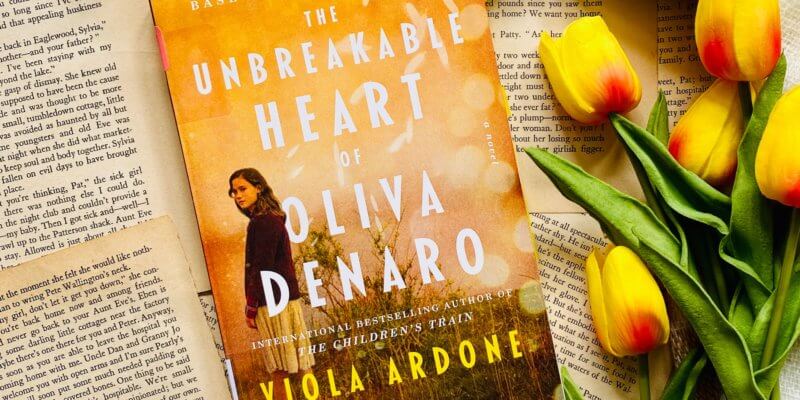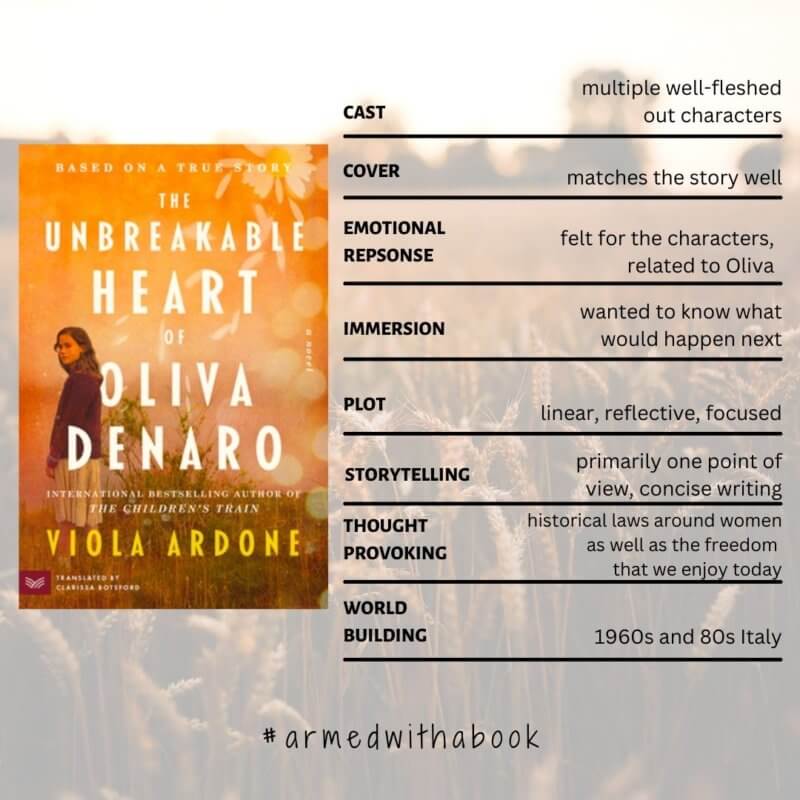Welcome friend! Some years back, I introduced you to the work of Viola Ardone and Clarissa Botsford through The Children’s Train. Set in post world war south Italy, the Communists were getting kids away to the North, where there was food and safety. The Unbreakable Heart of Oliva Denaro is another post-world war story, focusing on a young girl and her stance to oppose the man who raped her and question the tenets of society that allow him to be forgiven for his crimes by offering marriage. Here is the synopsis:

The Unbreakable Heart of Oliva Denaro
By Viola Ardone, Clarissa Botsford (Translator) | Goodreads
From the internationally bestselling author of The Children’s Train comes an unforgettable coming-of-age novel, set in 1960s Sicily and based on a true story, of how a young Sicilian girl defied centuries old tradition to win the right to control her own life.
As provincial Sicily bursts into life with the jaunty hum of pop music and the heady scent of wild jasmine, fifteen-year-old Oliva Denaro dares to challenge convention, ignoring the taunts of peers, her mother’s scolds, and her own changing body. Spirited and carefree, she loves to run until her lungs burst: to feel the strength of her lithe limbs, to relish the freedom she cherishes, to honor the friends forced by propriety to conform. Though she knows she cannot stop growing up, Oliva resists the future. To her, becoming a woman means denying oneself.
But adulthood comes all too quickly when the baker’s son sets his sights on her. Offered a blood orange, Oliva—haunted by her mother’s warning, “a girl who smiles has already said yes”—spurns the fruit. Yet, this act sets into motion an unwanted courtship that will force Oliva to fight for the right to choose her own path, even though the odds of winning are steep. While America and Europe are in the throes of social change, Sicily fiercely clings to its rigid traditions, including the custom of fuitina –by which kidnappings could be disguised as elopements– which is accepted and enshrined in law. Oliva’s battle for independence is based on the real-life story that would ultimately rock Italy–capturing the attention of both the Pope and the nation’s president—and transform life for all Italians.
The Unbreakable Heart of Oliva Denaro is a lyrical tale of staggering beauty. Viola Ardone beautifully evokes a land and its people, customs, and passions, and breathes life into an unforgettable girl in all her intensity, desperation, perseverance, and bravery. Alternating between the lighthearted and the tragic, it is a classic coming-of-age novel—powerful, spellbinding, and liberating.
Content notes include rape, sexism, misogyny, animal death, domestic abuse.
My thoughts on The Unbreakable Heart of Oliva Denaro
Oliva in The Unbreakable heart of Oliva Denaro
From a very young age, Oliva was acutely aware of the differences between herself and her twin brother. Her mother never left an opportunity to remind her that a girl’s image is precious. The very first words of the book, “A girl is a jug, you break her, you take her” speaks to the fragility of a woman’s position and the passing of her responsibility to the one who hurts her, without any consideration for herself. Growing up in the 1960s, after a certain age, girls are no longer allowed to associate with boys who they grew up with, they must always have a chaperone and dress decently. Oliva is a wild, free spirit. She questions the world and wants to live by her own rules. Her sister got pregnant before getting married and in Oliva’s words “has been buried alive at home as if she were already dead”. Oliva is aware of the lives women lead and at fifteen years of age, she is not for it.
Oliva has always had a strong personality. She has a clear idea of what she likes and what she doesn’t. “I am in favor of widows because they belong only to themselves.” She is growing up in a time when the position of women is slowly changing. With communist sentiments growing across the country, there are conversations happening about how men and women are different, if at all. These ideas are expanding to the classroom and Oliva’s teacher, Miss Rosaria, is a huge influence on her. In Liliana, Oliva finds a kindred spirit. Liliana has grown up in a communist family. She has dreams Oliva cannot imagine dreaming. I loved how their friendship continued to survive through the years and how they supported each other as they got older.
When Paternò starts to pay undue attention to her, Oliva is full of mixed feelings. On one side, she has never felt seen before. On the other side, these attentions have a creepiness to them. Her instincts are always telling her to run. Her mother’s observations at home solidify this: Paternò has shown interest but his intentions are clearly not in the right place. He does not come forward to ask for her hand, as a gentleman would. In order to stop his advances and secure a safe place in society for Oliva, the family finds her a match but this has consequences.
There is a lot of tension in The Unbreakable Heart of Oliva Denaro. Unwanted advances are always hard to read about and the drastic steps taken by Paternò to spoil and claim Oliva are heartbreaking and troubling. Oliva faces an existential crisis. Her thoughts as she grapples with the events and tries to make sense of what has happened to her, what it means for her future and how she feels now are enlightening and spoke to the strength she has.
Throughout the book, the societal position of women is analyzed but through the act of “elopement” (read “kidnapping”) and rape, darkest aspects are exposed. I had learned in Wedded Wife: A Feminist History of Marriage that there used to be laws that forgave a man for rape should he marry the woman. I did not know this happened in Italy. Oliva was encouraged by friends of family in the town to marry the man who had done her and the family grave harm and when she decided that she did not want to, that she would rather lodge a formal complaint with the authorities and see him punished, the town was divided. Oliva finds support in Liliana and her family. She meets new people, activists and lawyers working to question and change the cruel laws. Her father supports her in her pursuit of justice.

The Parents
Oliva’s mother ran a tight household. She was constantly berating Oliva and her father. She had to establish herself when she first moved to town after marriage and does not want her kids to feel the alienation she felt but she isn’t a dotting, loving mother. Her hands have always been chained by what society thinks is right and adequate for women and she prides herself of having settled her eldest daughter, even if it’s in a household when she is unhappy.
Oliva’s father is a man of few words. He is an uneducated man who has made a living as a farmer of many little things. He is ashamed of the life his eldest daughter has been thrust into and, with Olivia, he wants to do things differently. Though he has a son, Oliva has always been more interested in his crafts and he never hesitates to take her with him on his excursions. Through the father’s example, the book shows that change still has to start at the individual level.
I found the last part of the book quite innovative. Oliva had been the point of view in the first three parts. With the leap in time in the fourth, I was also offered the perspective of Oliva’s father who stood by all her decisions. He did not have a lot of hopes that the court case would bring her justice but he wanted her to pursue what she had set her mind on.
Changing Society
Similar to The Children’s Train, The Unbreakable Heart of Oliva Denaro also touches on communism but this time, it is more about its philosophy and growing popularity in small towns. Liliana’s father leads the meetings in the town, encouraging all who want to join and discuss the state of society to participate. It was fascinating to read about a changing society through these meetings. A place where existing ideas were freely challenged. In one of the meetings that Oliva attended, the group was discussing the vicious cycle in which society has trapped women: they want young girls to succeeded but the mothers bring them up with the same values and fears that they themselves faced, keeping them locked up and teaching them that every man is out there to get them. I liked the emphasis that change has to come as a society too.
The Translation
I love translated books. Clarissa Botsford shares her experience of translating this story from Italian – the choices she faced and how she handled them. I got more insight into the characters and the story through her notes, particularly the way she translated Oliva’s father’s words and the small and impactful ways in which his lack of education comes through in the story.

The Unbreakable Heart of Oliva Denaro is a beautiful book. It made me think about the freedom I enjoy in today’s society. The word I would use in Hindi in regards to the rules and restrictions imposed on women in the 1960s society of Italy is बंदिश. ‘bindings’ is a close enough translation, lacking the gravity I feel the original expresses in my mother tongue. While both the synopsis and my review talk a lot about the plot, the character and world development is well done in the book. If this is a time period or topic of interest to you, definitely pick up this book.
About the Author: Viola Ardone
Viola Ardone was born in Naples in 1974. A high school Latin and Italian teacher, she holds a degree in literature and worked in academic publishing. She is the author of two previous novels in Italian, La ricetta del cuore in subbuglio and Una rivoluzione sentimentale.
Many thanks to Random Things Tours and Harper360UK for giving me a chance to highlight this book on my blog in exchange for an honest review. I found a finished copy at my library and all quotes are verified with it.
Check out other reviewers on the tour:


Thanks for the blog tour support x